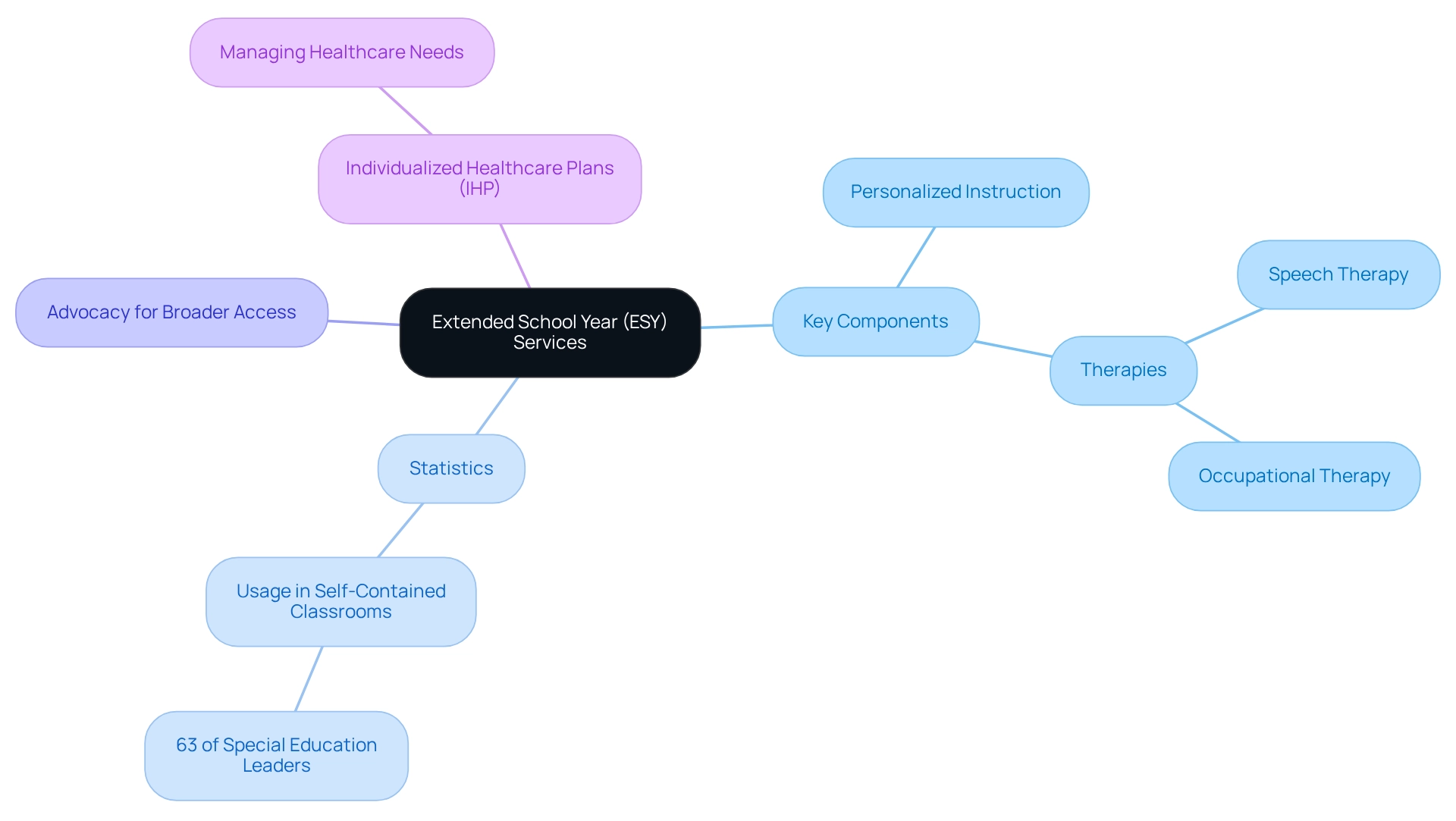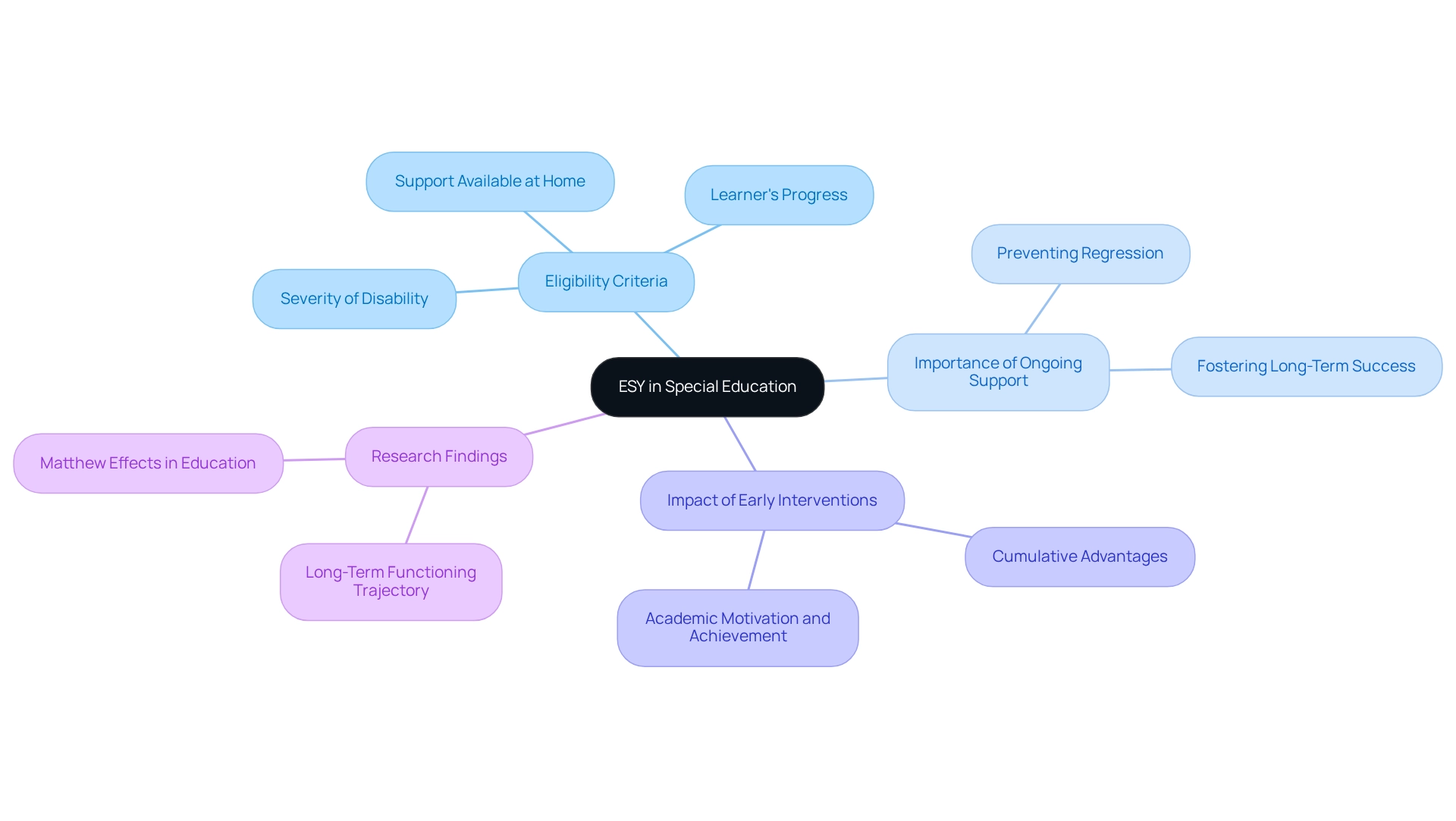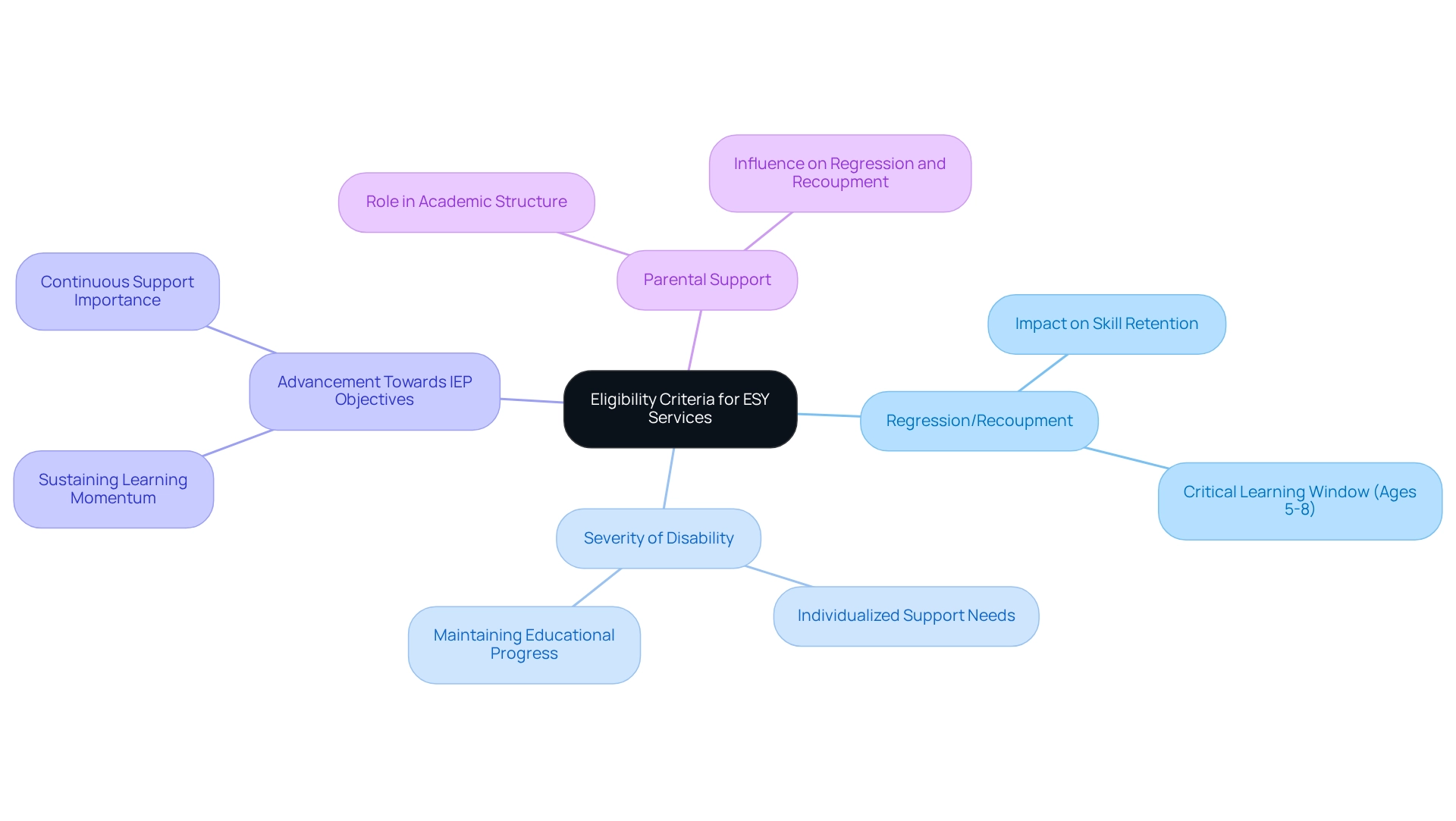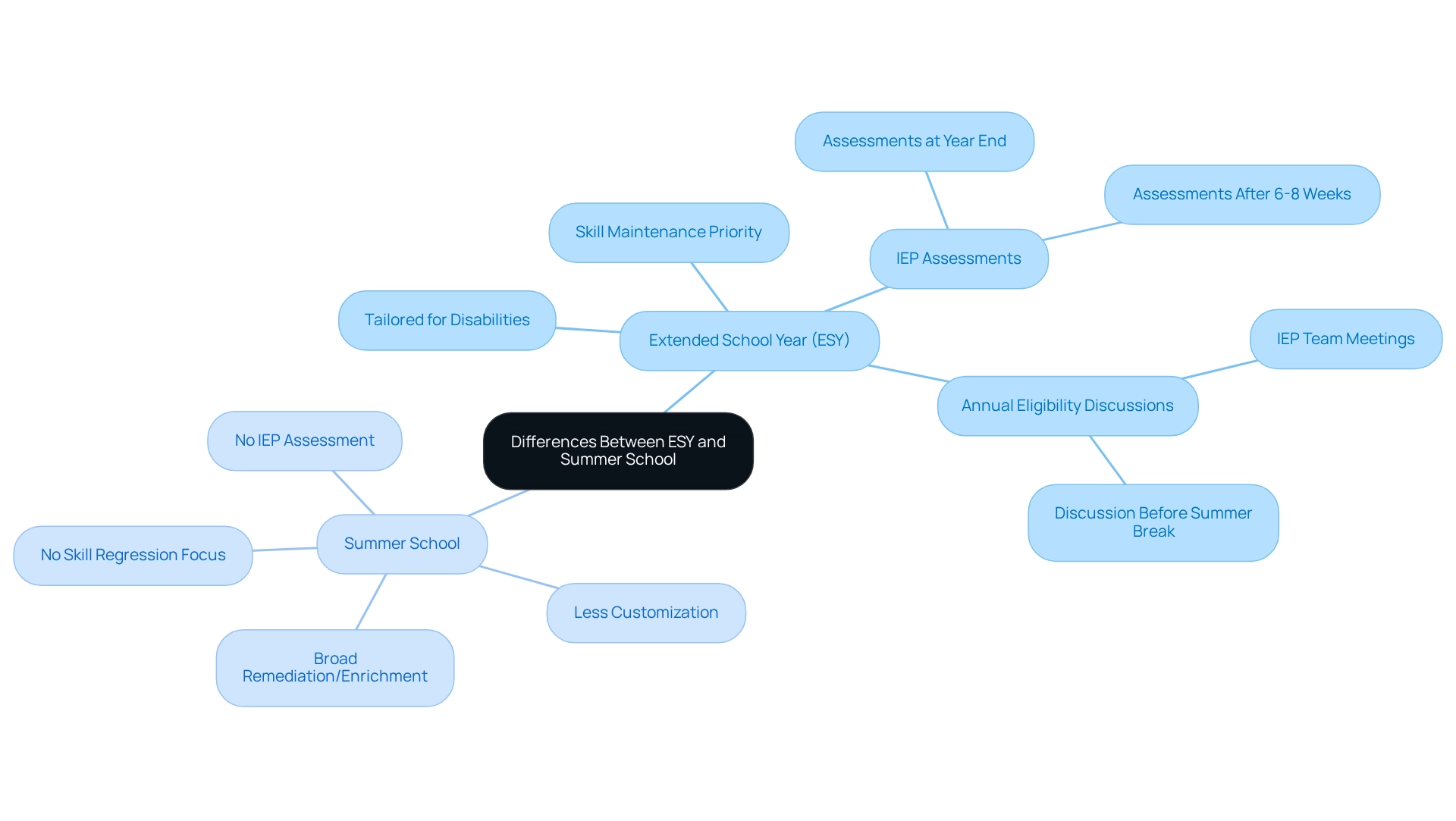Overview
Extended School Year (ESY) in special education is a vital service designed to support individuals with disabilities beyond the traditional academic year. This initiative aims to prevent the regression of skills and knowledge, ensuring that every learner continues to thrive. It’s important for parents to know that ESY programs are carefully tailored to meet the unique needs outlined in each child's Individualized Education Program (IEP). By focusing on these individual needs, ESY plays a critical role in maintaining academic progress and fostering continuous growth.
Consider the peace of mind that comes from knowing your child is receiving the support they need, even during the summer months. Imagine your child returning to school in the fall, not just ready to learn but eager to build on what they’ve accomplished. This is the promise of ESY—keeping the momentum going and ensuring that no child falls behind.
If you’re a parent navigating these waters, know that you’re not alone. Many families share similar concerns and experiences. We encourage you to reach out, share your stories, and connect with others who understand the journey. Together, we can advocate for the resources and support that every child deserves. Let’s work together to ensure that every learner has the opportunity to shine, not just during the school year, but all year round.
Introduction
In the world of special education, Extended School Year (ESY) services stand out as a vital support for students with disabilities. These services are designed to bridge the gap between school years, helping to prevent regression in essential skills and ensuring that students can maintain their educational momentum during long breaks. Unlike traditional summer school programs, which often focus on enrichment or remediation, ESY services are specifically tailored to meet the unique needs of each student as detailed in their Individualized Education Program (IEP).
As we continue to explore the conversation around educational equity, it is essential for educators, parents, and advocates to understand the significance of ESY services. This understanding highlights the ongoing support necessary to foster both academic success and personal growth for our students.
Define Extended School Year (ESY) Services
Extended School Year (ESY) offerings raise the question of what does esy stand for, as they provide essential special education and related support for individuals with disabilities beyond the standard 180-day academic year. These services are vital for preventing regression in the skills and knowledge that learners acquire during the school year. Unlike typical summer school programs that focus on enrichment or remediation, what does esy stand for refers to options specifically crafted to meet the unique needs of each learner as outlined in their Individualized Education Program (IEP). The primary aim is to help learners maintain their academic progress and essential skills throughout the summer.
Key components of ESY offerings include personalized instruction, speech therapy, occupational therapy, and other related support that nurtures the continuous growth of each learner. Recent findings indicate that 63% of special education leaders believe ESY resources are primarily used by individuals in self-contained classrooms, revealing a significant gap in support for those in inclusive settings. This underscores the importance of advocating for broader access to ESY services, highlighting what does esy stand for to ensure that all individuals with disabilities can benefit from these crucial supports. Experts emphasize that ESY services play a critical role in preventing skill regression, which can significantly impact a person's overall learning journey. As Lucy Barnard-Brak highlights, effective identification and support strategies are essential to meet the needs of individuals with disabilities. By implementing robust ESY programs, educational institutions can create an environment where individuals continue to flourish, enhancing their long-term success in both academic and social spheres. Additionally, Individualized Healthcare Plans (IHP or IHCP) can be invaluable in addressing specific healthcare needs during ESY, ensuring that every facet of a learner's development is supported.

Contextualize ESY in Special Education
In the context of the educational landscape shaped by the Individuals with Disabilities Education Act (IDEA), it's important to understand what does ESY stand for, as Extended School Year (ESY) programs play a vital role. This act ensures that individuals with disabilities receive a Free Appropriate Public Education (FAPE). Determining eligibility for ESY support involves personalized evaluations that assess each individual's unique needs. A significant consideration is whether a learner would face considerable regression in their abilities if these supports were unavailable during breaks in the academic calendar.
Several key factors influence eligibility, including:
- The severity of the disability
- The learner's progress throughout the school year
- The level of support available at home
It's important to understand what does ESY stand for, as ESY services are not universally available to all individuals with Individualized Education Programs (IEPs); rather, they are provided based on specific criteria demonstrating the need for these services to maintain learning progress.
This tailored approach reflects a commitment to personalized education, underscoring the importance of ongoing assistance for individuals with disabilities. Recent updates to IDEA in 2025 have clarified these eligibility criteria, ensuring that assessments align with contemporary educational practices. For example, evaluations may now include a learner's ability to retain skills over breaks, as well as their overall academic trajectory.
Research shows that early educational experiences significantly affect later academic motivation and achievement. A study revealed that 89 fourth-grade learners participated in a training program designed to enhance self-regulatory and mathematical problem-solving skills, emphasizing the importance of early interventions. This reinforces the concept of cumulative advantages in education, highlighting the necessity of providing ESY assistance to answer the question of what does ESY stand for in order to prevent regression and foster long-term success for students with disabilities.
As S. K. Mangal wisely noted, "The gap between the abilities and capacities of children related to their learning, adjustment and development found at the time of their birth, may further be widened by the nature of the environmental difference encountered by them in their nourishment and education." This statement underscores the critical need for ongoing support, particularly through ESY programs, prompting the question of what does ESY stand for.
Moreover, the case study titled 'Matthew Effects in Education' affirms that prior educational experiences significantly predict future academic motivation and success, reinforcing the argument for ESY support. Additionally, longitudinal research on 'Long-Term Functioning Trajectory for People with Disabilities' indicates that specific demographics and employment status correlate with improvements in functioning scores, providing insights into the long-term benefits of ESY support. As special education professionals continue to refine eligibility determinations, ongoing conversations about best practices and current trends in assessment methods remain essential to enhancing educational quality for these individuals.

Eligibility Criteria for ESY Services
Determining eligibility for Extended School Year (ESY) support, which raises the question of what does ESY stand for, is a collaborative journey involving the dedicated IEP team comprising educators, therapists, and guardians working together. The criteria for eligibility focus on several crucial factors that resonate deeply with the experiences of families:
- Regression/Recoupment: Consider the child who may lose essential skills over the summer, requiring significant time to regain them upon returning to school. This concern is particularly pronounced for children with moderate to severe autism, as research highlights a vital learning window between ages five and eight. Recognizing this critical phase underscores the importance of addressing regression, ensuring that these learners do not fall behind.
- Severity of Disability: For students with more significant disabilities, understanding what does ESY stand for becomes paramount in maintaining their educational progress. The IEP team must thoughtfully evaluate each learner's unique needs, ensuring they receive the right level of support tailored to their situation.
- Advancement Towards IEP Objectives: Imagine a student making significant strides towards their IEP goals, only to face the risk of losing that momentum during extended breaks. In such cases, understanding what does ESY stand for is crucial, as ESY assistance can be a lifeline, providing the continuous support necessary to sustain their learning journey.
- Parental Support: The role of parents in providing academic structure at home is crucial in determining eligibility. If parents can offer sufficient academic assistance, the need for ESY programs may lessen, allowing for a more personalized approach to each child's unique requirements. A case study on parental involvement illustrates how their engagement can significantly influence regression and recoupment, emphasizing the importance of this factor.
The IEP team's annual assessment of ESY provisions ensures that support remains relevant and effective, adapting to the evolving needs of individuals with disabilities. This ongoing evaluation is vital for nurturing self-esteem and confidence in learners, as it directly impacts their ability to thrive in educational settings. As a poignant reminder, "Only a special person can hear what a child cannot say," highlighting the importance of understanding and addressing the unique needs of each child.
As we navigate this process together, let’s ensure that every child receives the support they deserve. Your insights and experiences are invaluable—please share them with us in the comments or through our newsletter.

Benefits of Extended School Year Services
Extended School Year (ESY) programs offer invaluable benefits for individuals with disabilities, mainly by preventing the regression of acquired skills during lengthy breaks, which leads us to ask, what does ESY stand for? Research indicates that those who utilize ESY support are less prone to losing essential knowledge and skills compared to peers in traditional summer school programs, where the personalization to individual needs often falls short. This tailored approach not only ensures continuity in learning but also cultivates an environment where learners can build on their progress without interruption.
Importantly, the question of what does ESY stand for is recognized as a right for individuals with disabilities, which is vital for their educational growth. The effects of ESY services extend beyond mere academic retention; they significantly enhance self-esteem and confidence. As learners maintain and improve their skills, they experience a sense of accomplishment that bolsters their self-worth. Furthermore, ESY programs promote crucial social interactions, allowing learners to connect with peers in structured educational settings. These interactions are fundamental for social development, helping learners refine their social skills and overall well-being.
Case studies highlight the positive outcomes of ESY programs. For example, Rocio Delgado shares her daughter's experience at Brighton Center, where the child-centered approach not only fostered academic growth but also nurtured social skills such as empathy and acceptance. Such environments are instrumental in enhancing a student's confidence and self-esteem, which underscores the importance of advocating for ESY provisions as a right for students with disabilities, particularly in understanding what does ESY stand for. As one special education teacher remarked, "Used them for speech eval for my son. They were so professional, kind, and understanding... Highly recommend them. 5 stars is not enough!!" By ensuring access to these programs, parents and educators can help sustain academic progress and address the unique needs of their children.
Differences Between ESY and Summer School
Understanding what does esy stand for, as well as the differences between Extended School Year options and traditional summer school programs, is vital for effective educational planning. Summer school often aims to provide remediation or enrichment for a broad range of learners, while what does esy stand for are programs specifically designed for individuals with disabilities who need additional support to maintain their skills. These programs are tailored to reflect the unique needs outlined in each learner's Individualized Education Program (IEP). In contrast, summer school programs typically do not offer this level of customization.
Additionally, it is important to understand what does esy stand for, as its offerings prioritize skill maintenance over academic advancement, ensuring that learners do not regress during long breaks. For example, assessments of IEP skill performance should be conducted in the last two weeks of the school year and again after the first 6-8 weeks of the subsequent school year. This evaluation is crucial for determining the need for ESY services, as it helps identify whether learners are retaining their skills or facing regression.
Recognizing these distinctions is essential for parents and educators when selecting the most suitable options for supporting individuals with disabilities during the summer months. Advocacy efforts, such as those from organizations like Autism Speaks, highlight the importance of ongoing instructional support. For instance, Autism Speaks champions increased access to summer learning opportunities, emphasizing that individuals with autism significantly benefit from continuous academic engagement.
Understanding what does esy stand for is also important, as the maximum number of instructional days for ESY varies depending on the type of special education program, which is a key factor in differentiating between ESY and summer school programs. Moreover, the IEP team should discuss ESY eligibility at least once a year, ideally during the annual IEP meeting. This practice ensures that all necessary members are present to evaluate the student's progress and make informed decisions regarding ESY eligibility, ultimately supporting the student's educational journey. Such thorough discussions and advocacy efforts highlight the critical need for awareness and access to ESY services.

Conclusion
Extended School Year (ESY) services play a vital role in supporting students with disabilities by preventing skill regression during long breaks and ensuring continuous educational progress. Unlike traditional summer school programs, which often lack individualization, ESY services are thoughtfully tailored to meet each student's unique needs as outlined in their Individualized Education Program (IEP).
Eligibility for ESY services is determined through a collaborative process involving educators, therapists, and parents. This process focuses on key factors such as potential regression, severity of disability, and progress toward IEP goals. This individualized approach is essential for adapting to the evolving needs of each student, ensuring that every child receives the support they truly deserve.
The benefits of ESY services extend beyond academics. They significantly enhance students' self-esteem and social skills by providing structured environments for peer interaction, fostering essential social connections that are crucial for their development.
In conclusion, understanding and advocating for Extended School Year services is imperative for educators, parents, and advocates alike. Ensuring access to tailored support not only improves individual learning outcomes but also strengthens the educational community as a whole. By prioritizing continuous learning and skill retention, we can collectively commit to inclusive education, paving the way for a more equitable future for all students.
Frequently Asked Questions
What does ESY stand for?
ESY stands for Extended School Year, which provides essential special education and related support for individuals with disabilities beyond the standard 180-day academic year.
Why are ESY services important?
ESY services are vital for preventing regression in the skills and knowledge that learners acquire during the school year, helping them maintain their academic progress and essential skills throughout the summer.
How do ESY services differ from typical summer school programs?
Unlike typical summer school programs that focus on enrichment or remediation, ESY services are specifically crafted to meet the unique needs of each learner as outlined in their Individualized Education Program (IEP).
What are some key components of ESY offerings?
Key components of ESY offerings include personalized instruction, speech therapy, occupational therapy, and other related support that nurtures the continuous growth of each learner.
Who primarily uses ESY resources?
Recent findings indicate that 63% of special education leaders believe ESY resources are primarily used by individuals in self-contained classrooms, revealing a significant gap in support for those in inclusive settings.
What factors influence eligibility for ESY support?
Eligibility for ESY support is influenced by several key factors, including the severity of the disability, the learner's progress throughout the school year, and the level of support available at home.
Are ESY services available to all individuals with IEPs?
No, ESY services are not universally available to all individuals with IEPs; they are provided based on specific criteria demonstrating the need for these services to maintain learning progress.
How has the Individuals with Disabilities Education Act (IDEA) impacted ESY services?
The IDEA ensures that individuals with disabilities receive a Free Appropriate Public Education (FAPE) and has clarified eligibility criteria for ESY services in 2025 to align assessments with contemporary educational practices.
What is the significance of early educational experiences in relation to ESY?
Research shows that early educational experiences significantly affect later academic motivation and achievement, reinforcing the necessity of providing ESY assistance to prevent regression and foster long-term success for students with disabilities.
How do ESY programs contribute to the overall development of learners with disabilities?
ESY programs create an environment where individuals continue to flourish, enhancing their long-term success in both academic and social spheres, while also addressing specific healthcare needs through Individualized Healthcare Plans (IHP or IHCP).




